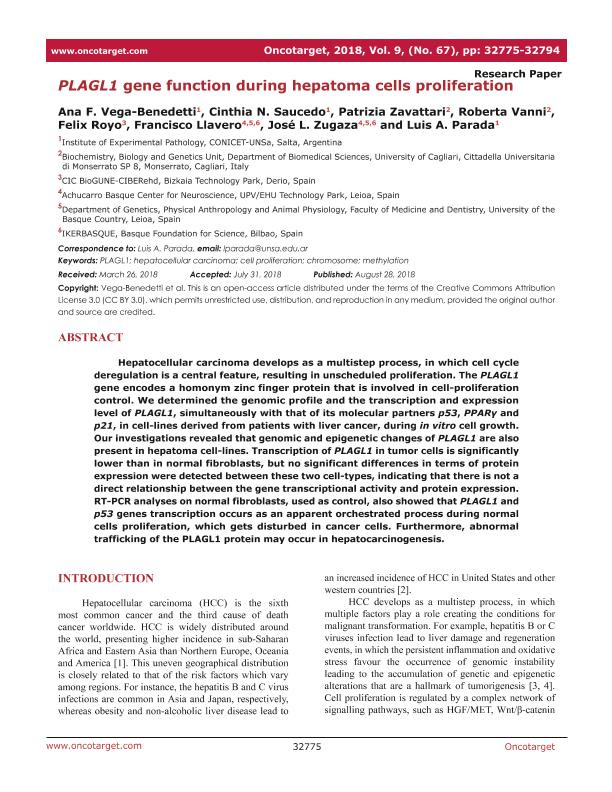Artículo
PLAGL1 gene function during hepatoma cells proliferation
Vega Benedetti, Ana Florencia ; Saucedo, Cinthia Natalia
; Saucedo, Cinthia Natalia ; Zavattari, Patrizia; Vanni, Roberta; Royo, Felix; LLavero, Freancisco; Zugaza, José L.; Parada, Luis Antonio
; Zavattari, Patrizia; Vanni, Roberta; Royo, Felix; LLavero, Freancisco; Zugaza, José L.; Parada, Luis Antonio
 ; Saucedo, Cinthia Natalia
; Saucedo, Cinthia Natalia ; Zavattari, Patrizia; Vanni, Roberta; Royo, Felix; LLavero, Freancisco; Zugaza, José L.; Parada, Luis Antonio
; Zavattari, Patrizia; Vanni, Roberta; Royo, Felix; LLavero, Freancisco; Zugaza, José L.; Parada, Luis Antonio
Fecha de publicación:
28/08/2018
Editorial:
Impact Journals LLC
Revista:
Oncotarget
e-ISSN:
1949-2553
Idioma:
Inglés
Tipo de recurso:
Artículo publicado
Clasificación temática:
Resumen
Hepatocellular carcinoma develops as a multistep process, in which cell cycle deregulation is a central feature, resulting in unscheduled proliferation. The PLAGL1 gene encodes a homonym zinc finger protein that is involved in cell-proliferation control. We determined the genomic profile and the transcription and expression level of PLAGL1, simultaneously with that of its molecular partners p53, PPARγ and p21, in cell-lines derived from patients with liver cancer, during in vitro cell growth. Our investigations revealed that genomic and epigenetic changes of PLAGL1 are also present in hepatoma cell-lines. Transcription of PLAGL1 in tumor cells is significantly lower than in normal fibroblasts, but no significant differences in terms of protein expression were detected between these two cell-types, indicating that there is not a direct relationship between the gene transcriptional activity and protein expression. RT-PCR analyses on normal fibroblasts, used as control, also showed that PLAGL1 and p53 genes transcription occurs as an apparent orchestrated process during normal cells proliferation, which gets disturbed in cancer cells. Furthermore, abnormal trafficking of the PLAGL1 protein may occur in hepatocarcinogenesis.
Palabras clave:
CELL PROLIFERATION
,
CHROMOSOME
,
HEPATOCELLULAR CARCINOMA
,
METHYLATION
,
PLAGL1
Archivos asociados
Licencia
Identificadores
Colecciones
Articulos(IPE)
Articulos de INST.DE PATOLOGIA EXPERIMENTAL
Articulos de INST.DE PATOLOGIA EXPERIMENTAL
Citación
Vega Benedetti, Ana Florencia; Saucedo, Cinthia Natalia; Zavattari, Patrizia; Vanni, Roberta; Royo, Felix; et al.; PLAGL1 gene function during hepatoma cells proliferation; Impact Journals LLC; Oncotarget; 9; 67; 28-8-2018; 32775-32794
Compartir
Altmétricas



